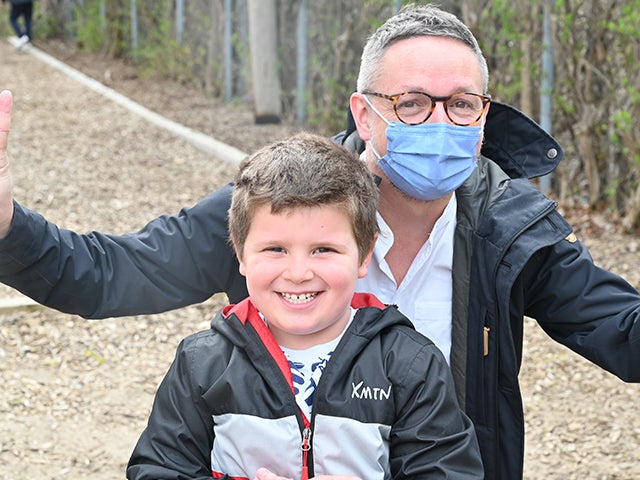Giant Steps celebrates 40 years

Thomas Henderson spending time in the Giant Steps schoolyard with a student on April 20. Photo: Paul Karwatsky
By Wendy Singer
Founded in 1980 by Darlene Berringer, Giant Steps School is a private school recognized and subsidized in the public interest by the Ministry of Education that welcomes students aged four to 21 with autism. On the occasion of the school’s 40th anniversary, Inspirations spoke with Thomas Henderson, director-general since 2014, to discuss the school’s accomplishments, challenges and exciting plans for the future.
What is Giant Steps’ greatest achievement?
Keeping the spirit in which Giant Steps was founded alive. That’s a spirit of innovation and keeping ourselves at the forefront of autism services. We were one of the first autism-specific schools in the world, and our model was replicated in other cities. What we did in the beginning years by implementing a model that is fundamentally founded on inclusion - before inclusion was even a common term - was revolutionary.
What is the biggest challenge the autism community faces?
Access to appropriate supports and services. These include wait times and having varied services that really respond to the needs of the community, at any age. No one group or organization can achieve this alone. We’ve managed by establishing key partnerships and are always looking to collaborate with others.
During the pandemic, running a school for special needs students where some can’t necessarily apply the health and safety protocols like wearing masks, has come with its challenges. Our staff and families have risen to the challenge. It has not been easy. Also, the pandemic has made it impossible to implement our inclusion model where students attend their local schools.
Has the perception of autism changed over the years?
Completely! Awareness has gone up 1,000 percent. In the 1980s when I started working in the field, autism was very rarely diagnosed and poorly understood. Now it would be hard to find someone that doesn’t have a fairly good understanding of what it is. We went from a very deficit-based model of autism – that is in some ways still there – to a strength-based approach, focusing on neurodiversity and an individual’s strengths.
What has Giant Steps’ role been in transforming perceptions?
We’ve always tried to be a model for thinking outside of the box, being innovative and really student-centered. For us, it’s all about the needs of our students, their families, and communities. If the focus is on the actual people then you’re able to provide services that make sense.
Has your student profile changed?
Yes. We’re a school that is complimentary with the public school system, so we receive the students who can’t necessarily be successful in their regular school setting. As the school boards develop more and more services they refer different types of kids as well. There’s been a shift over time as more community services become available. We’re there to complement those systems.
How did the Giant Steps Autism Centre come to be?
When I became director-general it was pretty obvious to me that we needed to consider changing locations. After not finding an ideal location, we went deep into a process with community stakeholders, and asked, “If money was no limit if we could build the dream, what would it look like?” We realized there was a need for something much bigger. It was a go-big-or-go-home situation, and we decided to go big!
What will it feature?
It is a state-of-the-art centre based on four pillars: Education (preschool, elementary and secondary); Adult Education and Training Centre (employment training); Resource and Community Centre; and Research and Innovation Centre, which will include a living lab that will be a hub for school-based autism research. Student capacity will rise from 90 to 120, and we will add five inclusive classrooms that can accommodate another 50 students, autistic and non-autistic.. Adult education capacity will increase from 12 to 50 students, with many more served through employment support programs.
It’s an ambitious project, located in the Technopole Angus neighborhood. We’re all extremely excited about it and believe in its importance. We can see by the community’s response that they think so too. We are partway through our fundraising campaign and hope to start construction as soon as possible and open in 2023.
Read more about the Giant Steps Autism Centre at www.giantstepsautismcentre.com.









